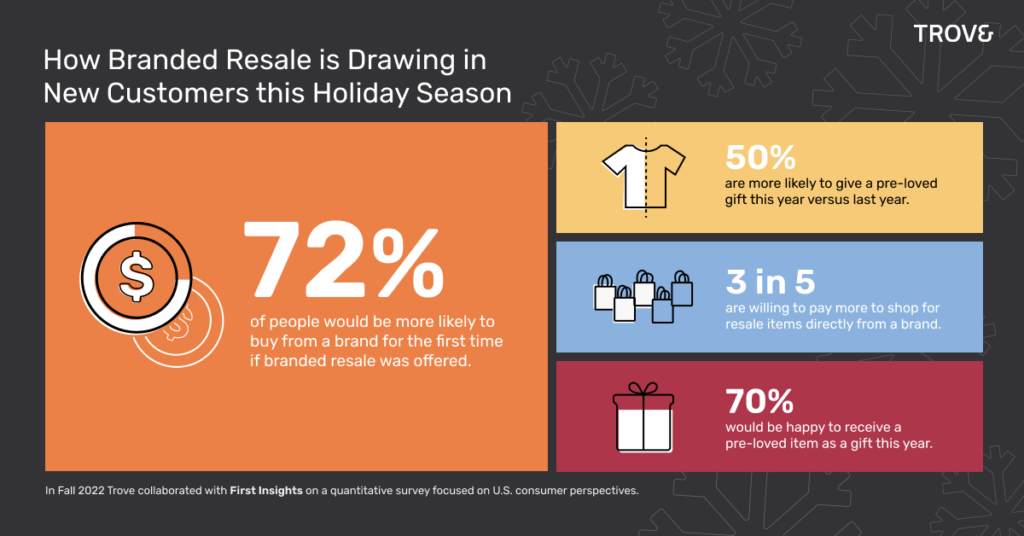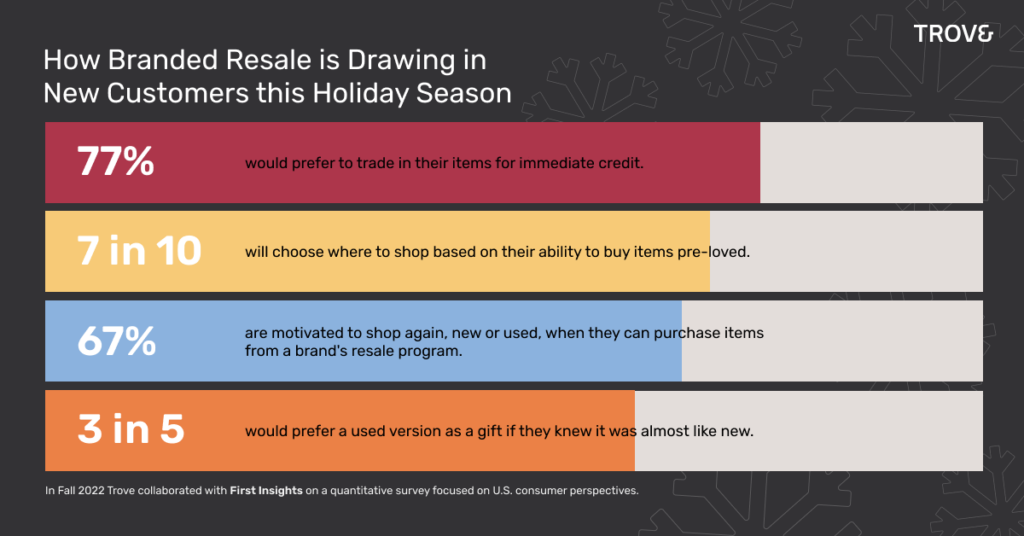How Branded Resale Transforms Returns into Profitable Revenue
How Branded Resale Transforms Returns into Profitable Revenue
7 MINS READ
The last three years have created unprecedented challenges for retailers. New shopper habits, rising inflation, and supply chain delays have altered the retail landscape. For brands, finding creative ways to drive revenue is critical.
One channel that generates immediate ROI? Branded resale.
Branded resale describes retailers who operate resale channels in-house. With branded resale, fashion brands can transform their apparel returns and pre-loved trade-in items into revenue while supporting sustainability efforts.
Today, Lululemon, REI, Patagonia, and Levi’s have implemented white-label branded resale platforms with Trove.
The benefits of branded resale extend beyond helping retailers meet their sustainability goals. Leveraging inventory from customers’ closets and fashion returns creates new opportunities for brand growth.
Why should brands open branded resale marketplaces?
As the retail landscape continues to change, retailers must rethink retail operations. “There’s a lot of reasons why now is the right time to start a branded resale channel,” says Pete Small, VP of Partnerships at Trove. “It’s only been bolstered by the macro environment.”
Small compares the growth of recommerce to the early days of e-commerce. “Any industry data that you look at points to resale as a channel continuing to grow and to demographic shifts towards buying used,” he says. “It’s very much an investment towards where the market is going. It’s been compared to what e-commerce was 20 or 25 years ago.”
Learn More About Why Branded Resale Should Be Your Growth Strategy.
Here are five reasons why brands should invest in branded recommerce.
1. Transform fashion returns into profitable and sustainable inventory
According to the National Retail Federation, returns accounted for $761 billion in lost sales in 2021. Shoppers returned approximately 16.6% of all merchandise purchased during the year. With the acceleration of ecommerce, that number is expected to grow.
Returns not only reduce profits but are also destructive to the environment. Every year, returns contribute to almost six billion pounds of landfill waste in the United States. And the shipping of returns emits over 16 million tons of CO2.
With branded resale, retailers minimize losses on returns and reduce their environmental impact. Small argues that returns “gives your brand the opportunity to engage with your product at a different price point.”
Small also stresses that returns offer an easy way to get started with resale programs. By using existing inventory, recommerce programs provide ROI on day one.
Discover how the resale business model potentially contributes to environmental sustainability benefits, by downloading the Branded Resale Index.
2. Fashion recommerce combats supply chain shortages
The COVID-19 pandemic caused supply chain disruptions for retailers across all categories. Repeated factory shutdowns left retailers with low inventory levels. The US Census Bureau found retailers had only 33 days of inventory in June 2021, down from 43 days in February 2020. The Russia-Ukraine war has only worsened the problem by blocking shipping routes.
With branded resale, retailers have immediate access to a new source of inventory. “There are thousands of items of inventory… already out in the market,” says Small. “Some of it is being used. Likely a large part of it is sitting dormant in closets. And the [mission] of our program is to get that product back in use.”
Branded resale allows retailers to access untapped inventory and provide customers with products faster.
3. Shoppers demand sustainable options
A growing awareness of climate change has led people to explore more sustainable lifestyles. Today, 40% of shoppers cite sustainability as the reason they buy pre-loved goods.
Gen Z shoppers were early adopters of the recommerce market, participating in sites like Depop, Poshmark, and StockX. Now, 62% of Gen Z prefer to buy from eco-conscious brands, and 54% are willing to pay more for sustainable products.
At the same time, Gen Z shoppers are wary of greenwashing. It’s not enough for brands to say they care about the planet. Retailers must incorporate sustainability into every aspect of their operations—including product materials, manufacturing, and shipping.
But Gen Z is not the only generation that values sustainability. Shoppers of all ages are adopting more environmentally-conscious purchasing habits. Last year, Baby Boomers represented the fastest-growing segment in the resale market. The number of Baby Boomers participating in recommerce increased by 56% year-over-year.

4. Branded resale drives more value out of your product
Branded resale as a channel also enhances the customer experience. With trade-in, repair, and resale programs, brands enable customers to participate in a circular ecosystem. At REI, trade-ins have become an integral part of its membership program. Last year, REI expanded its trade-in program to all its retail stores and sold over one million pre-loved goods.
Branded resale enables retailers to maximize the value of their products. Elizabeth Cline, the author of The Conscious Closet, found that recommerce extends a product’s lifespan 1.7 times. As a result, brands can resell the product multiple times.
Most importantly, branded resale puts retailers in control. “Whether or not you as a brand decide to build your own program, the activity is going to happen in the market,” says Small. “You can choose to ignore [it] or you can choose to take advantage of all that activity. [You want to] ensure that you are putting out the best customer experience and recouping the maximum value from your customers and products.”
With branded resale, retailers maintain control over their brand identity and pricing. Brands can also focus on providing shoppers with the best customer experience.
5. Branded resale provides immediate ROI despite economic uncertainty
Finally, branded resale enables brands to compete with rising inflation and economic uncertainty. Today, 36% of shoppers buy pre-worn goods to save money or afford products. When shoppers tighten their wallets, branded resale allows retailers to remain accessible.
“Resale [can be] counter-cyclical to the macroenvironment. As there are challenges with the economy, people are typically looking for a more value option. Resale is a good way to enable that,” says Small.
With branded resale, retailers can repurpose existing inventory to help drive revenue in a volatile economy.

What should brands know before implementing branded resale?
Run Your Recommerce like Ecommerce
While returns make it easy to start a resale program, brands must be strategic to ensure success. “It’s important to think about resale like you would any new business,” says Small. “Essentially [you’re] building a new startup. You need resourcing for that business. You need dedicated decision-making.”
A retailer must approach branded resale the same way they would grow a sub-brand. At the same time, a retailer should understand how the recommerce channel will complement and support the company’s core business.
The path to profitability takes time
As with any new business, success takes time. Brands must establish clear metrics and milestones to track progress.
Small stresses that retailers should understand how branded resale impacts the rest of their brands’ ecosystems. Customer lifetime value, engagement, and gift card programs are a few metrics to consider. “We encourage our partners to not only look at the P&L of the resale business on its own… but also other parts that are influencing the wider business,” he says.
Flexibility is essential
At the same time, Small recommends remaining flexible. “Every brand is unique, and their customer base is unique, so we should be open to change,” he says. “[At Trove], we’re well-equipped to help you manage those changes. We’ve built a number of checkpoints into the process… to assess what’s going well, where there’s an opportunity, [and] where we can improve.”
Trove approaches each brand as a strategic partner, offering ongoing support through every step of the business.
Branded recommerce with Trove
Trove is an all-in-one white-label platform that powers branded resale. With Trove, retailers design and operate sustainable branded resale programs–right from their websites.
With the ability to tap into existing inventory—such as trade-in programs or returns—Trove helps drive immediate results. And retailers have access to a comprehensive analytics dashboard to help them grow their resale business.
Get started today to see how brands drive immediate ROI with Trove.




